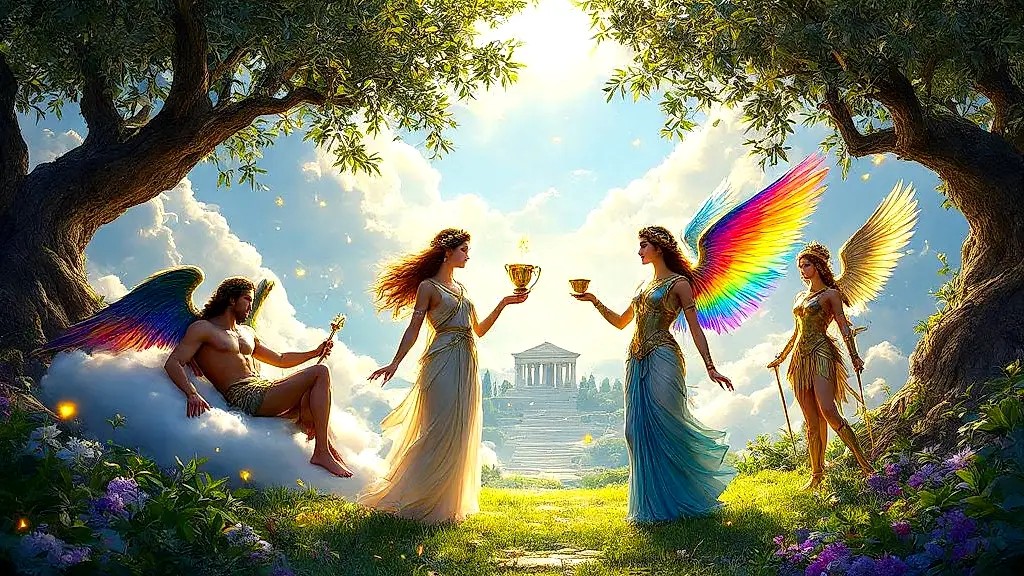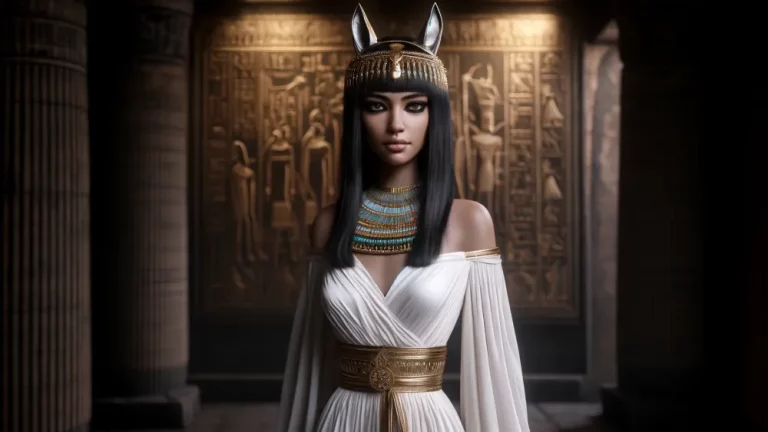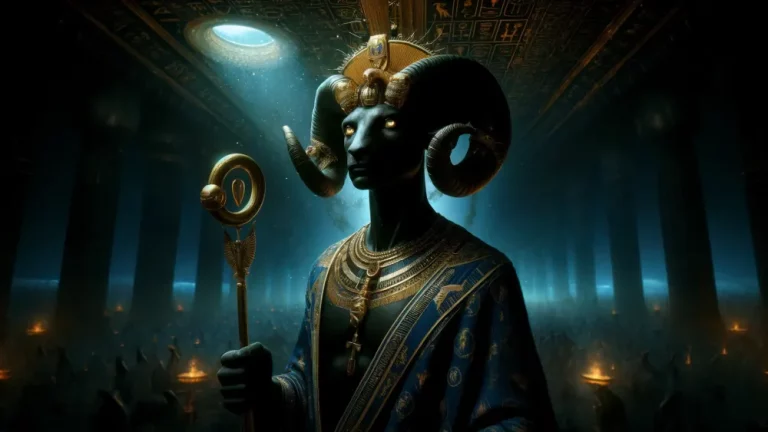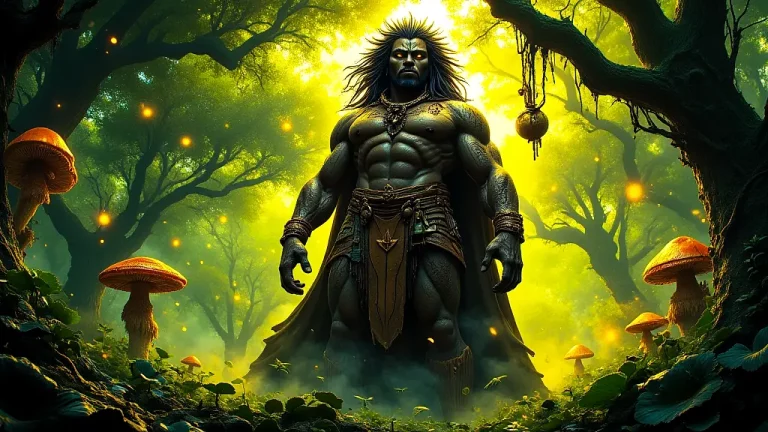Exploring The Lesser Gods Of Greek Mythology And Their Roles
You probably know Zeus and Athena from Greek myths. But there were many lesser gods too. These deities controlled dreams, bees, and other small but important things. Unlike the Olympians, they had very specific roles, almost like experts in a divine system. Their stories mattered to everyday Greeks. They guarded doors, helped crops grow, and even cursed lovers.
Key Points:
- Lesser Greek gods handled small but important things like dreams, bees, and doorways, unlike the big Olympian gods.
- Some, like Echo, got cursed to only repeat words, while others, like the Keres, took souls during wars.
- People worshipped them at home with simple rituals, like leaving food for Zeus Ktesios or milk for Pan.
- Stories about them explain natural stuff, like why flowers fade or how echoes work in mountains.
- They pop up in famous tales, like when a dream tricked Agamemnon in the Iliad or when the Keres grabbed Hector’s soul.
- Compared to Norse gods, Greek minor gods had narrower jobs, while Norse ones did more at once.
- Odd ones like Priapus, linked to gardens and fertility, had weird myths, like getting fooled by a donkey.
One famous example is Echo, doomed to repeat words forever. In this post, we’ll explore forgotten tales like hers. We’ll also examine the Keres, spirits that thrived in the chaos of war. Some myths have different versions. Since they sometimes contradict each other, we’ll point out the differences. Let’s discover these forgotten gods together.
Lesser Gods Of Greek Mythology: Overview and Key Facts
| Category | Example | Domain | Key Fact |
|---|---|---|---|
| Nymphs | Naiads | Freshwater (rivers, springs) | They took care of rivers and springs, much like guardians. Certain legends claim Oceanus fathered them. |
| Personifications | Hypnos (Sleep) | Sleep and dreams | Hypnos lived in a cave with his twin, Thanatos (Death). Even Zeus couldn’t resist his power, which terrified humans. |
| Chthonic Gods | Hecate | Crossroads, magic, ghosts | People worshipped her as both a Titan and an underworld god, which was unusual. She used torches to lead souls. |
| Rustic Deities | Pan | Shepherds, wild forests | His loud cries created panic, and according to some stories, Hermes was his father. |
| Spirits | Keres | Violent death, battlefield | They gathered on battlefields to claim the souls of the dead. In the Iliad, they feed on fallen warriors. |
| Minor Olympians | Iris (Rainbow) | Messengers, rainbows | She carried messages using her rainbow. But unlike Hermes, she worked only for Hera. |
Note: Myths vary – for example, some texts say Pan existed before the Olympians, while others link him to Hermes.
What Are the Lesser Gods in Greek Mythology?
But first, if we want to see how they fit into Greek mythology, we need to identify what separates them from the main Olympian gods.
Understanding Lesser and Major Gods
The Greek gods were organized in a hierarchy. At the top stood the Olympians like Zeus, Hera, and Athena. They governed universal domains including justice, war, and the heavens. These main gods lived on Mount Olympus and were worshipped throughout Greece. They often interfered directly in human lives. Their stories are the central ones in Greek mythology.
However, hundreds of other gods existed below them. These lesser deities handled specific tasks. They differed from Olympians in several important ways:
- Limited Domains: Zeus controlled the sky, but gods like Hypnos managed only sleep. River gods like Achelous ruled just one waterway.
- Localized Worship: Many were connected to particular places. Nymphs, for example, protected specific springs or groves.
- Partial Immortality: Some beings like daemons stood between gods and humans in status.
- Specialized Functions: Certain deities represented particular ideas. Hermaphroditus embodied gender fluidity.
- Limited Autonomy: Most served higher gods. The Furies enforced curses but answered to Hades.
Note: Some figures like Hecate don’t fit neatly into these categories. Different traditions worshipped her both as a Titan and an underworld deity.
The Greek gods had a clear order, with powerful Olympians like Zeus ruling big things while smaller gods handled specific tasks in limited areas.
Types of Lesser Deities
Greek mythology was full of minor gods, each overseeing particular aspects of nature and human life. They were organized by specific roles, with the Olympians at the top and these lesser beings managing more focused areas. Nymphs cared for natural features while other deities represented abstract ideas. This system shows how Greeks explained natural phenomena. In fact, even the moment of death had its own gods – the Keres.
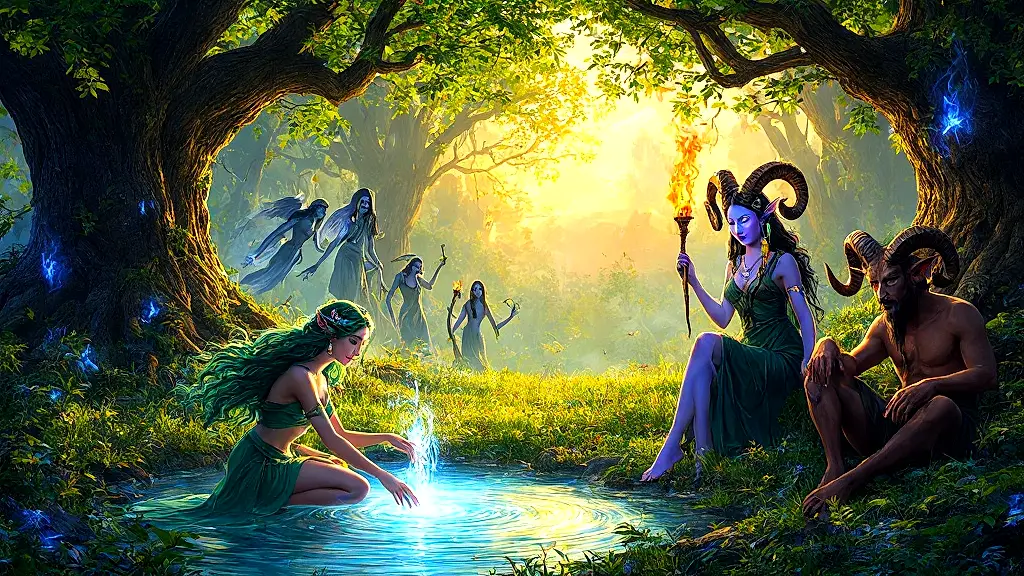
However, some figures crossed categories. Hecate, for example, was both an underworld god and a Titan in different traditions.
| Type | Example | Domain | Associated Myth |
|---|---|---|---|
| Nymphs | Naiads | Freshwater bodies | Water nymphs kidnapped Hylas |
| Personifications | Hypnos | Sleep | Made Zeus fall asleep |
| Chthonic Gods | Hecate | Underworld, magic | Helped Demeter search for Persephone |
| Spirits | Keres | Violent death | Appeared during Trojan War battles |
| Rustic Deities | Pan | Wilderness, shepherds | Created the pan flute |
| Sea Deities | Nereids | Mediterranean Sea | Thetis protected sailors |
Note: Sources sometimes disagree on classifications – some describe certain nymphs as demi-goddesses rather than full deities.
How Lesser Gods Shaped Everyday Life
The Olympians handled big universal matters. But the lesser deities actually affected everyday activities. We’ll see how they impacted everything from home rituals to farm work.
Gods Who Protected Homes
Ancient Greeks honored gods for home protection. Hestia watched over the hearth, which sat in the central location of each home. Meanwhile, Zeus Herkeios protected entryways as the guardian of thresholds. Families regularly offered oil to door hinges, believing these needed divine care.
The main protective practices included:
- Zeus Ktesios: Families kept a food jar in storerooms for prosperity
- Hestia’s Hearth: They burned the first portion of meals as an offering
- Protective Rituals: Families hung garlic or placed Hermes’ symbols near doors
- New Moon Offerings: They left special round cakes at crossroads for Hecate
- Birth Rituals: Parents carried newborns around the hearth to bless them
Regional note: Athenian families added pillars outside homes for Apollo Agyieus.
Gods of the Wild and Harvest
Pan, the goat-legged god, served as protector of shepherds. Though known as a trickster, herders relied on his wilderness knowledge. They carved his image into pine bark and left milk offerings at mountain shrines, believing his panpipes scared away wolves. In Arcadia, shepherds listened for whispers in oak leaves, which they interpreted as grazing advice. While Pan protected shepherds, people credited Aristaeus with agricultural wisdom.
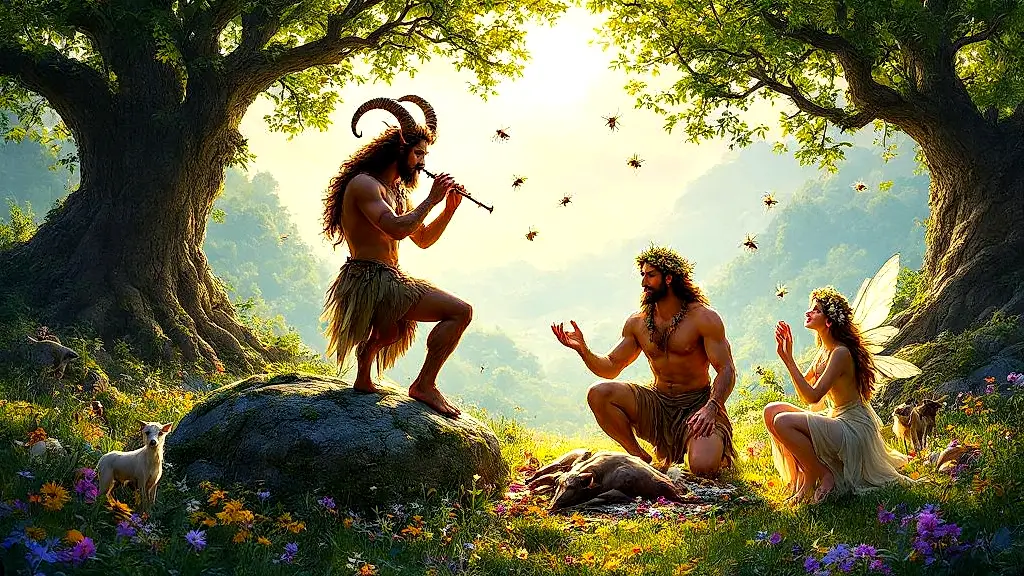
His myth claims he rediscovered beekeeping after his bees died. Through a ritual sacrificing eight cattle, new bees emerged from the carcasses. This strange tale likely came from observing bees nesting in remains, later becoming religious teaching. Similarly ephemeral were the Anthousai, or flower nymphs. These spirits appeared each spring and vanished by autumn.
Young girls offered them flower crowns during festivals, while farmers watched them as seasonal markers. Greeks believed each nymph died with her flower, explaining why some blossoms lasted days while others thrived for months.
Myths We’ve Forgotten About Minor Gods
We’ve looked at what minor gods did. But they also have compelling stories that people have largely forgotten. These tales show unexpected sides of Greece’s system of gods.
Echo’s Sad Story
Echo started as a loquacious mountain nymph. Her constant talking helped Zeus distract Hera from his affairs, until the queen discovered the trick. In anger, Hera cursed Echo to only repeat others’ words. This changed her ability to converse into a frustrating limitation. Her situation worsened when Narcissus rejected her. This beautiful youth refused all admirers.
Due to Hera’s curse, Echo could only mirror his words back to him. When Narcissus became obsessed with his reflection, her weakening voice became a clear example of unreturned affection. She repeated his last words as she gradually disappeared. Some versions say her body became stone while her voice remained.
Echo’s influence continues today:
- Natural Phenomenon: Mountain echoes were thought to be her remaining voice
- Literary Device: Poets use repetition methods based on her myth
- Psychological Term: “Echoism” describes people who copy others
- Cultural Depictions: Artists show her near Narcissus’ pool
- Modern References: It influenced radar names and audio effects
Regional Note: Some versions say her father was river god Lado, while others call her one of the original mountain nymphs.
Priapus and the Donkey’s Revenge
During a feast for Dionysus, the fertility god Priapus noticed the attractive nymph Lotis sleeping. Known for his exaggerated features and constant desire, he moved toward the sleeping nymph. His intentions were clear. People respected Priapus as a protector of gardens and animals. Yet they also mocked him for his uncontrolled desires.
An unexpected outcome occurred when a donkey suddenly brayed. This animal was sacred to Dionysus, Priapus’ rival. The noise woke everyone, and Lotis escaped in fear. Revealed Priapus’ actions made him the subject of ridicule among the gods. This event had lasting effects:
- Cultural Symbol: Priapus statues became protective objects
- Religious Ritual: Some areas sacrificed donkeys to him
- Literary Trope: Roman poets used him for comedy
- Artistic Depictions: Often shown with exaggerated features and donkeys
- Modern Analysis: Scholars see it as a lesson about desires
Regional Note: In Lampsacus, people worshipped Priapus as a main god and rarely mentioned this story.
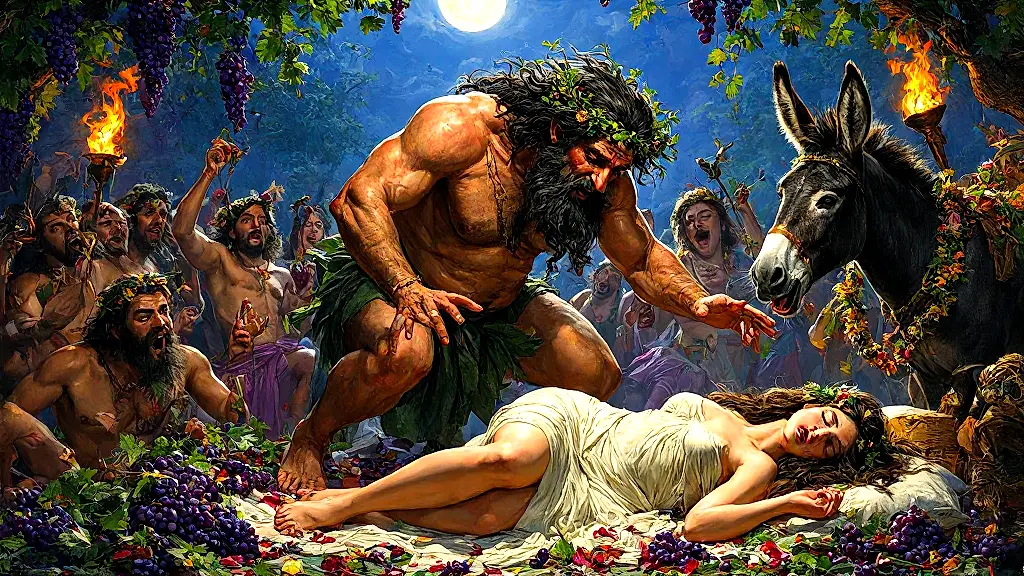
Priapus tried to take advantage of a sleeping nymph but was stopped by a donkey’s loud noise, leading to his embarrassment and lasting cultural impact.
Lesser Gods in Famous Stories
We know the major gods well. But lesser gods also had key parts in Greece’s famous stories. Their small actions often changed what happened to heroes and how great battles ended.
The Oneiroi’s Trick in the Iliad
Zeus sent a harmful dream to Agamemnon at Troy. It appeared as Nestor (Iliad 2.6). This dream spirit was one of Night’s thousand children. It gave false victory promises because Agamemnon wanted to end the long war. Homer says it copied Nestor’s form and voice exactly. This shows Greeks saw dreams as real messages from gods.
The divine trick had serious results. When Agamemnon acted on the false dream, his army almost left until Odysseus stopped them. For Greeks, this showed the unequal power between gods and people. The event reveals important ideas:
- Divine Testing: Zeus later said this tested Greek courage (Iliad 2.112-115)
- Types of Dreams: Greeks knew two kinds – true ones from below and false ones from gods
- Battle Practices: Even false signs needed experts like Calchas to explain them
Ancient tablets prove early Greeks valued dream meanings. Later writers said dream oracles worked during the Trojan War. Homer used this event to show how gods’ decisions made human suffering worse in war.
The Keres’ Feast During the Trojan War
The Keres were winged, screaming spirits on battlefields. Their claws had blood and metal as they took dying warriors. Achilles‘ shield showed the frightening “dark Keres” (Iliad 18.535). They pulled dead bodies by the feet, showing war’s unpredictable deaths. These daughters of Night worked with violent purpose, and their presence made soldiers afraid before dying.
Hector became their most famous victim. When Apollo left him, the Keres of cruel death stood nearby (Iliad 22). They grabbed his soul before he stopped breathing. This shows important Greek ideas:
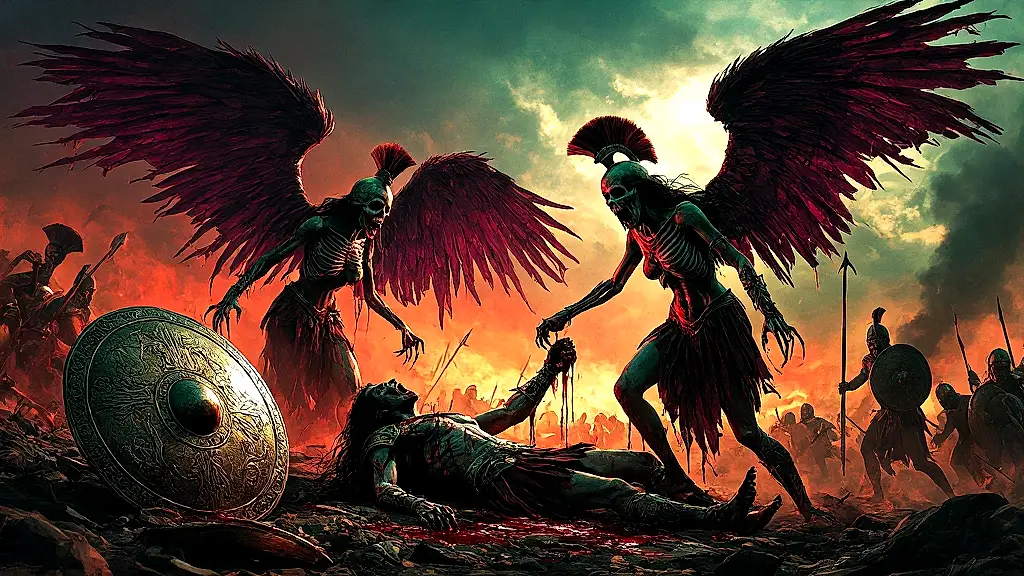
- Taking Souls: Keres physically removed souls from bodies
- Gods’ Orders: They followed Fate’s commands
- Aftermath: Their actions explained scavengers on battlefields
- Art Shows: Later paintings made them look like gorgons
Note: Some Greeks worshipped Keres as protectors from early death.
How Greek Lesser Gods Compare to Other Cultures
Greek lesser gods have specific traits, but similar beings appear in many ancient religions. Different cultures had their own versions. Each one matched that culture’s beliefs and needs.
Greek vs. Norse Minor Gods
Both pantheons had gods for specific areas, but their approaches show important cultural contrasts. Greeks made gods for ideas like victory. Norse gods covered natural forces and social roles. Vidar handled both silence and revenge, which demonstrates the Norse tendency for multi-purpose deities. Greeks focused on ideas, while Norse needed practical gods for their harsh environment.
Key equivalents between the pantheons:
| Domain | Greek God | Norse Equivalent | Notes |
|---|---|---|---|
| Victory | Nike | Sigyn (partial) | Sigyn mainly linked to loyalty |
| Sea Winds | Anemoi | Njord | Njord also controlled fishing |
| Death Spirits | Keres | Valkyries | Valkyries chose who died |
| Fertility | Priapus | Freyr | Both shown with male fertility symbols |
| Dreams | Oneiroi | Draumr (rare) | Norse dream gods weren’t as detailed |
| Hearth | Hestia | Frigg (partial) | Frigg had more responsibilities |
Elves may be like nymphs, but this isn’t certain. The table shows Norse gods handled more roles than Greek specialists. Scandinavia’s tough climate required versatile gods. Where Greeks had four wind gods, Norse typically combined these under Njord’s control.
FAQs
1. How were lesser gods worshipped compared to Olympians?
Lesser gods were worshipped through smaller, localized rituals and household offerings, while Olympians received grand public festivals and pan-Hellenic temples.
2. Did lesser gods ever overthrow major gods in myths?
Lesser gods overthrowing major gods was exceptionally rare, with myths primarily showcasing Olympian supremacy despite minor rebellions like Prometheus‘ defiance.
3. Which lesser god had the strangest domain?
The lesser god with the strangest domain was Priapus, the fertility deity associated with gardens, livestock, and grotesquely exaggerated male anatomy.
4. Are there hybrid creatures considered lesser gods?
Hybrid creatures like Pan, the satyr-god of the wild, were indeed worshipped as lesser gods in Greek mythology.

